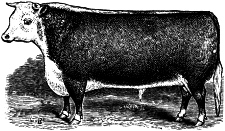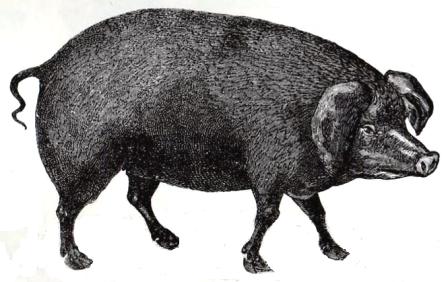Transatlantic Transgressions: The River Cottage Meat Book by Hugh Fearnley-Whittingstall.
The attitudes of most Americans about British foods are so ingrained with distortion that a venture like britishfoodinamerica may appear hopeless or, worse, silly. Conventional wisdom will find no point in it, as reflected in the reviews that greeted publication of The River Cottage Meat Book by  Hugh Fearnley-Whittingstall. Contrast the treatment of the book on either side of the Atlantic. Writing in the Guardian, Felicity Lawrence locates Fearnley-Whittingstall as heir to the British ‘scholar-chef’ mantle previously passed from Elizabeth David to Jane Grigson. There can be no greater or more deserved praise for the author of a cookbook.
Hugh Fearnley-Whittingstall. Contrast the treatment of the book on either side of the Atlantic. Writing in the Guardian, Felicity Lawrence locates Fearnley-Whittingstall as heir to the British ‘scholar-chef’ mantle previously passed from Elizabeth David to Jane Grigson. There can be no greater or more deserved praise for the author of a cookbook.
American reviews, however, describe a caricature of the book. One has appeared in the summer issue of Gastronomica, a worthy if uneven and sometimes dull “journal of food and culture.” It is by Betty Fussell, a cook and celebrity author described in the December issue of Saveur as “the preeminent culinary historian.” (Saveur 24) Readers familiar with Meat only from her review are in for a surprise: The book contains cooking techniques and recipes, hundreds of them, each carefully and lucidly described and explained. Fussell discusses only Fearnley-Whittingstall’s “media persona suggestive of an aging Wild Child” and his opposition to industrial meat production along with some of her views on publishing and British history.
She is nonplussed at the size of the book, which may explain why she apparently did not read past page 24 (she adopts the lazy reviewer’s gambit of providing quotation only from the beginning) and indisputably did not review its recipes:
“A book this big is appropriate to a country as big as America, but England is the size of Alabama, and rural Dorset, site of the author’s River Cottage series of television programs and cookbooks, is smaller than Jefferson County, just one of the sixty-seven counties of Alabama.”
Perhaps the nation of Chaucer (long series of tales), Dickens (long novels) and
Churchill (multivolume histories) should now confine itself to publishing pamphlets.
Fussell may be a good cook and expert on foodstuffs (corn apparently is the font of all civilization in the western hemisphere) but has no grip when it comes to Britain. She contrasts the vast farms of the American plains with “England’s mixed agricultural practices of plowed fields and livestock on small-scale farms on a small island.” This is risible. At least since the entry of Britain into the European Union, with its Common Agricultural Policy that provides lavish subsidies to growers, agribusiness at scale has dominated British agriculture no less than agribusiness has dominated the United States. Furthermore, less than a handful of supermarket chains dominates food retailing in Britain, a fact that further encourages food production on an industrial scale. These are salient reasons why Fearnley-Whittingstall has offered his philosophy of humane husbandry along with his recipes.
It gets worse when Fussell takes a stab at history. It is anachronistic, for example, to claim that the English landscape “was blotched but not utterly destroyed by the Industrial Revolution” when in fact it was hardly touched. The growth of the new manufacturing centers in the early nineteenth century concentrated urban populations rather than dispersing them in a suburban or exurban sprawl.
Fussell cannot bring herself to address Fearnley-Whittingstall’s cooking at least in part because she cannot bring herself to accept the existence of a competent British cuisine. During an interview following the 1999 publication of Fussell’s memoir of divorce (this is a confessional age), My Kitchen Wars, she explained that
“British cuisine has, in its restaurants, always been mostly French. That is, the good stuff has always come from across the channel and been imported into England. People like Escoffier and the Ritz, that’s French cuisine. The cache [sic] has always been French, and still is, like the Roux brothers in England. It’s very hard to get good British cooking in restaurants.”
Particularly outside of the cities, that claim has been false for decades, and if Fussell were right, then London diners at scores of restaurants serving British cuisine, from Corrigan’s in Mayfair to St. John Bread & Wine in Spitalfields, are hallucinating.
Writing an earlier review of Meat in The New Yorker (cited by Fussell; it demonstrably influenced her), Bill Buford, author of the commercial kitchen memoir Heat, lists five British recipes only to dismiss them all (“each a revival effort and each definitively without appeal”) without disclosing that the book includes American, Asian, French and other preparations in addition to the British ones. This would get in Buford’s way: It is easier to lampoon a British cook’s British recipes than to provide the reader with information about a serious and comprehensive cookbook.
Like Fussell, Buford concentrates on the author’s celebrity status rather than on his recipes and marvels at the length of the book (maybe the pamphleteers would have a ready market in the United States). Buford marvels too at Fearnley-Whittingstall’s messy habits (there are pictures of unwashed plates after dinner!) and his “tolerance for chaos… that may be without precedent among people who make a living from preparing food.” Where did Buford work to get material for Heat? Restaurant kitchens are chaos.
Buford discusses Pork & Sons by Stephane Reynaud (another good, if more problematic, compendium of recipes) in the same review and it fares better. He intones that it is different from Fearnley-Whittingstall: “It is a cookbook.” No, Pork & Sons is not different from Meat because it is a cookbook: It is different because it is a French cookbook and, in contrast to his dismissal of British dishes, Buford wants to cook the French ones.
 At bfia we want to cook the British recipes as well as the others, and many times have prepared both Fearnley-Whittingstall’s and our own versions of the disfavored five that Buford lists (steak and kidney pie, Lancashire hot pot, beef in stout, shepherd’s pie, and sausages with pheasant and bacon in batter). They are good and will be revelatory to the uninitiated. But do not take our word for it. Meat did win a James Beard award; cock a snook at ignorance and snobbery, and buy the book. Buford agrees, to a point. He notes that Fearnley-Whittingstall manages to roast a pig on a spit after several failed attempts and concedes that “in the event of your ever having to cook one, you will want a copy of his book nearby.” Tonight’s recipe does not involve a whole pig, but we want Meat nearby tonight because Fearnley-Whittingstall’s Anglicized version of pork simmered in milk and herbs is for dinner.
At bfia we want to cook the British recipes as well as the others, and many times have prepared both Fearnley-Whittingstall’s and our own versions of the disfavored five that Buford lists (steak and kidney pie, Lancashire hot pot, beef in stout, shepherd’s pie, and sausages with pheasant and bacon in batter). They are good and will be revelatory to the uninitiated. But do not take our word for it. Meat did win a James Beard award; cock a snook at ignorance and snobbery, and buy the book. Buford agrees, to a point. He notes that Fearnley-Whittingstall manages to roast a pig on a spit after several failed attempts and concedes that “in the event of your ever having to cook one, you will want a copy of his book nearby.” Tonight’s recipe does not involve a whole pig, but we want Meat nearby tonight because Fearnley-Whittingstall’s Anglicized version of pork simmered in milk and herbs is for dinner.
Our annotated recipe for beef in stout appears in this number of the practical.
Sources.
Bill Buford, “A critic at large: Red, White and Bleu,” The New Yorker (3 December 2007)
Betty Fussell, “The River Cottage Meat Book,” Gastronomica Books in Review (Summer 2008)
Sarah Karasiewicz, “Sacred Cows,” Saveur number 116 (December 2008)
Felicity Lawrence, “The Choicest Cut,” the Guardian (19 June 2004)
Hugh Fearnley-Whittingstall, The River Cottage Meat Book (Berkeley 2007; British edition London 2004)
Stephane Reynaud, Pork & Sons (New York 2007)
Cheri Sicard, “A conversation with chef and author Betty Fussell,” www.fabulousfood.com (undated)

